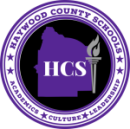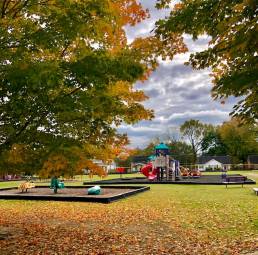Academic Focus – AECC
The evolution of education is a tireless process. From one room schoolhouses to fully virtual schools, public education has seen waves of transformations since its inception. The growing reach of local and federal legislation has affected education in both good and bad ways, but the people doing on the forefront – building level leaders and teachers – have always had one priority: making sure students are learning in ways that are best preparing them for future success.
In Haywood County Schools, teachers and district personnel strive to know each student by name, strength, and need. Through a high-quality and rigorous curriculum, students are given personalized learning instruction and are consistently challenged to continue to grow and learn in each of their subjects. Supporting this learning on each campus is a team of school-level leaders who reinforce the academic focuses of the district and support teachers as they educate students to learn in ways that are both effective and engaging.
To facilitate learning at all levels, five schools in HCS have Instructional Facilitators (IF) on their campuses. Instructional Facilitators wear many hats such as supporting curriculum implementation, organizing intervention times, providing real-time instructional coaching for teachers, leading Professional Learning Communities, and disaggregating data to best inform future instruction. If’s play a critical role in making sure the academic focuses of each campus are consistently maintained.
At Anderson Early Childhood Center (AECC), Jeanna Lea is in her second year as Instructional Facilitator. Prior to assuming this role, Jeanna was a teacher at Haywood Elementary School. Her experience in early childhood education is something she leans on in her role as IF at Anderson.
For the Pre-Kindergarten and Kindergarten students at Anderson, this is their first experience in a school building. Students are adjusting to being away from their parents as well as having to move through a full day of school. Before any type of academic instruction can begin, students have to learn procedures for classrooms and hallways and the cafeteria and anything else that’s involved in a day at AECC.
“Initially, our students struggle with separation from their parents. Another adjustment is just having stamina to make it through the day,” Jeanna explained. “We have to teach procedures to our young learners. It normally takes about six weeks to drill those procedures to get the students fully adjusted.”
Once the students become accustomed to being at school for a full day, the learning really begins. For Pre-K students, that learning is done through a lot of play and activities that, on the surface, look very different from what one would normally think about when thinking of learning in a school setting.
“In the Pre-K classroom everything is introductory. A lot of it is socially based; students learning just how to interact with their peers and with their teachers. As far as literacy is concerned, we really focus on sounds. They are really honing in on the sounds,” Jeanna said. “In math, they’re looking for number recognition and counting. All of the learning in the pre-k classroom is centered around play. The students are learning letter sounds and number recognition but they think they’re just playing.”
As students transition to Kindergarten, the work and activity in a classroom begins to transition to a hybrid model of play and learning.
“In Kindergarten, we see a huge amount of growth during that year. We actually have Kindergartners leaving at the end of the year who are truly reading; they’re fluently reading sentences with expression and comprehension,” Jeanna explained. “We have kindergartners who come in who may only know a few letter sounds. They may not be blending sounds, but they progress to where they’re blending three and four and five letter words and reading text.”
Jeanna attributes much of that success to the excellent teaching being done by the faculty at AECC, as well as the implementation of a new program known as “The I Am a Reader and Writer Project” or – as it’s known around the school district – “The Reader/Writer Project.”
The Reader/Writer project was implemented in AECC last school year and is designed to deliver reading instruction in a surgical-like focus to students and meet those students wherever they are along the spectrum of reading. The Reader/Writer curriculum is used during the 45 minute intervention block and AECC and is also supported by having three adults in each classroom during that block.
“The Reader/Writer project has proven to be very successful for us. During the 45 minute intervention time, each student gets exactly what they need to progress with the English code. Each child has individual learning targets, and we have three adults in each room and students cycle through groups and there’s a laser focus on teaching students where they are,” Jeanna said. “During this time, students get a ten minute dose of phonemic awareness and then work with an adult in a small group with targeted practice that meets the individual student where they are.”
Like all students in HCS, students at AECC are given benchmark assessments three times during the school year in order to monitor their learning. One of Jeanna’s responsibilities is to help teachers comb through that data and most effectively plan their lessons for each student based on that student’s growth and needs.
As teachers plan their lessons using their curriculum, discussion and collaboration about student learning must take place. Jeanna helps facilitate these discussions in Professional Learning Communities (PLC’s). During PLC’s, teachers evaluate student work and discuss what mastery looks like within a given subject. Teachers also share ideas about what works for them and collaborate in ways that are student-centered and learning-centered.
Jeanna described everything that takes place in PLC’s at AECC.
“In our PLC’s, we focus on instruction and curriculum. We dig deep. We ask questions. ‘What did we do last week?’ We see what worked and didn’t work. We look ahead to what’s coming up. What strategies do we want to use? What student struggles do we anticipate in the upcoming lesson and how will we help students overcome those struggles?”
Another aspect of Jeanna’s role is to support teachers as they deliver instruction in classrooms. In order to do that, Jeanna and the administrative team will consistently visit classrooms to observe all of the learning taking place.
“As we do our walk-throughs, we want to see student engagement. Is the teacher teaching the content? Is the student learning? That can look a lot of different ways,” she said.
AECC saw incredible amounts of growth in reading and math last school year; they surpassed every academic goal they set as a school and helped lay the beginnings of an excellent foundation for their students. Jeanna knows that laying the foundation for reading success at an early age is arguably the most important job in education.
“Laying the foundation for reading at this age is everything. If there are gaps in the foundation, the students will struggle until those gaps are filled. The Reader/Writer project really addresses that foundation. It ensures the students have what they need to move forward successfully,” she said.
She also knows the important role that parents and guardians play in laying this foundation, too.
“One of the most important things a parent can do is to engage with their child in conversation; speak to the child, spend time with them. Also, make sure they get enough rest and read to them as much as possible.”
As the procedures and routines of this school year begin to come together and the school day starts to function like a well oiled machine, Jeanna knows that AECC will only continue to build on the success of last year.
“We want to keep the momentum we had from last year going. Teachers are excited about it. It’s our second year with The Reader/Writer project and now we feel like we’re experts in this process,” she explained.
The positive work in education is normally a slow bend and foundations that are laid take time to become set in place. The work being done at AECC, however, is doing just that.


